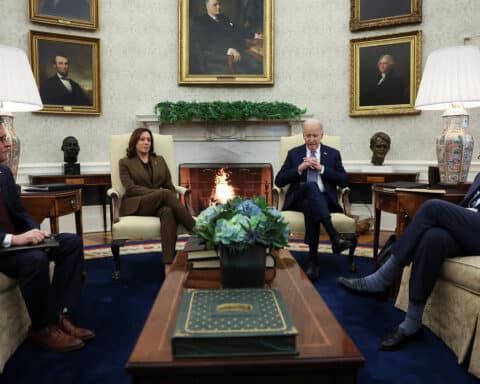“The other thing you notice when you take a little time off is how unbelievably stupid most of the debates you see on television are. They’re completely irrelevant. They mean nothing. In five years, we won’t even remember that we had them.” So said Tucker Carlson in a video message that went viral on Twitter a few days after his dismissal from Fox News.
Only Nixon, it was said, could go to China. Or Reagan to Reykjavik. In the same way, it’s perhaps not a surprise that Carlson, for some time now the most popular talking head not only on Fox News but on all media, would be the one to tell his fellow Americans that the bread and butter of not only Fox News but MSNBC and CNN and every other 24-hour cable and radio “news” network is “unbelievably stupid” and “completely irrelevant” to the problems facing the United States today.
Carlson’s remarks came in the wake of his (still unexplained) dismissal from Fox News, which came in the wake of the company’s $787.5 million settlement with Dominion Voting Systems over the latter’s civil lawsuit alleging that Fox had materially damaged Dominion’s business by deliberately airing allegations about Dominion and the 2020 election that Fox News executives and on-air personalities, such as Carlson, knew to be false. In the process of discovery, while preparing for the lawsuit, Dominion uncovered many emails and texts from employees of Fox News that supported its claim and likely led Fox to choose to settle rather than to go to trial.
The size of the settlement was unprecedented, but the allegations that a media company was unconcerned with the truth — or willing to make claims it knew were untrue in order to advance an agenda — were not. For decades, such claims have been made about, among others, MSNBC, CNN, CBS, the Washington Post, the Wall Street Journal, and the New York Times, and internal memos, emails and recorded conversations at these and other media companies have given weight to those claims. As Scripture says, there’s nothing new under the sun.
Nearly 60 years ago, in 1964, Marshall McLuhan coined the phrase “the medium is the message.” It is perhaps no coincidence that McLuhan was a Catholic, for he understood intuitively how the way in which a message is conveyed — the medium — shapes (in McLuhan’s words) “the scale and form of human association and action.” In John’s Gospel we read, “The Word became flesh and made his dwelling among us, and we saw his glory” (Jn 1:14). But when our words go forth from us, the extent to which they partake of the glory of the Word made flesh depends, in part, not only on their inherent truthfulness (or lack thereof) but on the medium through which we bring them to life.
In 1964, there were no 24-hour “news” channels nor panels of “talking heads” who were paid not to hold discussions aimed at arriving at the truth but to advance particular partisan views that may or may not coincide more or less with the truth. When panelists start with the idea that their job is to win a debate no matter the cost to the truth, is it any surprise that crosstalk, yelling and name-calling follow?
Add to that the economic factor: The higher the ratings received by a Tucker Carlson or a Don Lemon (fired from CNN within hours of Carlson’s firing from Fox), the more the network can charge for advertising on his show. Working viewers up is a great way to increase ratings. It’s also, alas, a very effective way to ensure that people recreate the debates that they see onscreen with family, friends and co-workers, which has led inexorably to the increase in political polarization of Americans over the last few decades.
Marshall McLuhan died in 1980, the year that CNN, the first 24-hour news network, was founded, but were he alive today, he could explain why debates that are “unbelievably stupid” and “completely irrelevant” dominate the airwaves. He could also provide us with some tips on how to change public discourse to promote a culture that views truth as more important than debates that “mean nothing.”
Since the medium is the message, one necessary step in returning to the truth is to change the medium. Turn off the talking-head shows, and pick up a Catholic periodical or scroll a Catholic news site. Turn to journalists and commentators who are being paid to tell the truth rather than to spread partisan talking points or increase ratings. Be careful in your use of social media sites, which, when it comes to political, cultural and moral issues, too often exhibit the same failures as a medium as the 24-hour “news” channels do.
Most importantly, change your own approach to discussing important issues with your family, friends and co-workers (and be cautious about starting such discussions with strangers). Speak the truth in charity. Be willing to listen and to ask genuine questions of your interlocutors. Don’t think that you need to resolve everything all at once. Build your relationships with those around you based on mutual respect, charity and — always — regard for the truth.
Do that, and in five years, your family, friends and co-workers may well remember your conversations, particularly because the medium in which they were held conveyed the message that truth and charity are more important than politics, partisanship and economic gain.
Our Sunday Visitor Editorial Board: Father Patrick Briscoe, Gretchen R. Crowe, Scott P. Richert, Scott Warden, York Young





